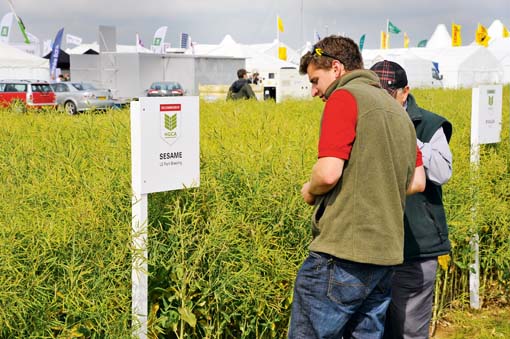Conventionals challenge dominance of hybrids

Most of the oilseed rape seed sales to date are hybrids and their market share will increase considerably this year, according to the main retailers.
“Once you get north of the Humber, hybrids dominate,” says David Waite, northern seed commercial manager for Frontier Agriculture. “But even in the Midlands, the split between hybrids and conventionals has now reached 50:50.”
Their better performance in a dry growing season is just one of the reasons, he suggests. “There’s also their superior light leaf spot resistance, which seems to be becoming more important, and their spring vigour, which was badly needed this year.”
Lee Bennett of Openfield also sees the hybrid share increasing. “Excalibur, DK ExPower and Dimension are all flying out of the door. Some 85% of our total sales to date have been hybrids, which is very different to this time last year.”
Their ability to manage environmental stresses better, together with improving yields and the lure of rapid advances in the future, is a powerful combination, he says.
“We’re going to see some good hybrid types coming through in the next couple of years. Some are being sold early, and they’re going very quickly.”
But conventional varieties will also sell well, predicts Masstock’s Barry Barker, despite various concerns about late frosts, pest attack and pod set in the past couple of years.
“The top two in the east and west region, Sesame and DK Cabernet will be popular again,” he says. “And growers who want to stick with conventional varieties will also get good performance from the likes of Fashion and Vision.”
Likewise, Mr Bennett recognises the success that conventionals have achieved and predicts that Catana, Fashion, Sesame and DK Cabernet will all be in demand again.
“Catana is just as good a proposition for the east and west region as it is for the north,” he points out. “And Fashion has shown good vigour.”
Simon Kightley of NIAB TAGsays oilseed rape variety choice is all about maximising yields and spreading risks, rather than going down a particular route. His shortlist includes both hybrid and conventional varieties, with consistency also being a key requirement.
“There’s always a place for a variety which has proved itself and given consistent results. The hybrids PR46W21 and Excalibur are good examples of this, as are the conventionals Fashion and Vision.”
For those considering some of the new varieties on the Recommended List, Mr Kightley picks out hybrid variety Compass, which is the top of the northern list at 108% of the control and also performs well in the east and west region.
Another new hybrid, Rhino, is also worth a look, he suggests. “It’s got the early maturity and relatively short plant height that attracted growers to Excalibur. But it also offers a bit of extra yield.”
For top yields, conventional types Sesame and DK Cabernet are hard to beat, says Mr Kightley. “But they’re both late maturing, so find the right partners to grow alongside them if this bothers you.”
Of the low biomass varieties, he mentions two semi-dwarfs and two old favourites. “DK Sequoia, which is new on the Recommended List this year, is closing the yield gap associated with semi dwarfs. And PR45D05 is the top-performing semi dwarf in the north.”
Castille and Es Astrid, both of which can now be beaten on yield, have remained popular due to their early maturity and short, stiff stature, he says. “But they will be challenged even more this year.”
Candidates to watch
Leading the field of candidates is DK Camelot, the last conventional variety to come from the Dekalb breeding programme.
“It’s short and early, which suggests that it could be a Castille replacement,” notes Mr Kightley. “It’s up for recommendation in the north as well as the east and west region.”
DK Camelot is being sold exclusively by United Oilseeds and will be available for planting this autumn, ahead of the final decision on its recommendation, confirms the company.
Rascal, another conventional candidate, is picked out by Mr Kightley for its stem canker resistance. “It gets an eight rating, which is good to see. It’s also short and early, which has proved to be a popular combination.”
His final mention is for the hybrid semi-dwarf Thorin, which represents another step forwards for this specialist category. “It shows that they can compete with the rest on yield.”
Seeds Focus

